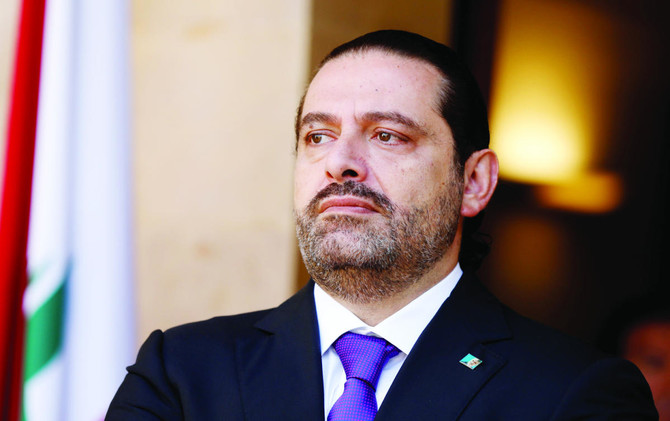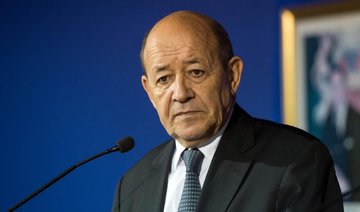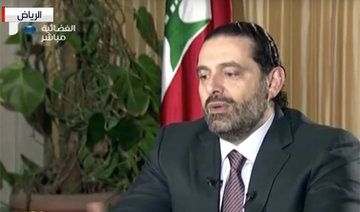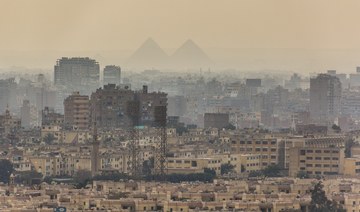BEIRUT: The live TV appearance and on Sunday night of Saad Hariri, who resigned as Lebanon’s prime minister on Nov. 4, has put the Lebanese people at ease.
After the interview, statements made by Hariri’s adversaries about his being under “house arrest” were refuted and replaced by statements welcoming his stances and anticipating his return, which he promised would be “in two days.”
“They tried to disparage Hariri’s resignation by focusing on the way he resigned and distracting everyone from his demand to maintain Lebanon’s self-distancing policy and keep the country out of Arab conflicts,” Antoine Zahra, member of the Lebanese Forces’ parliamentary bloc, told Arab News.
“They also slammed the Lebanese Forces for supporting Hariri,” he added.
“It turned out that Hariri, who tolerated the intolerable, is looking for ways to ensure the political settlement’s success while his adversaries exploit it to get Lebanon further involved in the region’s conflicts.”
Zahra described what happened through the campaign against Saudi Arabia as “burying one’s head in the sand.”
He said: “In a tone different from the one he used in his resignation statement, Hariri said he was keen to achieve a settlement but it required two parties, and that he had put personal efforts into it and endured continuous personal attacks as well as on the settlement which would lead Lebanon to a deadly phase. How can Hezbollah’s hostility toward the rest of the Arab world be coated? Hezbollah is punishing the Lebanese people by measures that are, at the least, choking the country’s economy.”
“There are no constitutional restrictions on Al-Hariri’s resignation from abroad,” he explained, and then asked: “Do the ministers’ resignations from Rabieh (President Aoun’s former residence when he was head of the Free Patriotic Movement) count as constitutional while Al-Hariri’s doesn’t?”
Zahra predicts that Hariri will be re-assigned upon forming the next government because “political powers have no other candidate to negotiate re-settlement on its original basis after the new mandate.”
According to a statement released by the media office at Baabda Palace, President Michel Aoun commented on remarks made by Hariri, which indicated that the political settlement still stands and that he has the option of retracting his resignation. “I am pleased that Al-Hariri will return soon to Lebanon and I’ll be waiting to discuss with him the reasons behind his resignation, the circumstances surrounding it and other topics of concern that need to be addressed,” he said.
Aoun also hailed the coherence between the Lebanese people, “which has protected national unity and proved to the rest of the world that Lebanon is a sovereign and independent country.”
Lebanon’s political authorities were quick to comment on Hariri’s statements through tweets that expressed how they eagerly anticipated his return to Lebanon.
Nabih Berri, the speaker of the Lebanese Parliament, said: “There is justice in the retraction of Hariri’s resignation.”
Walid Jumblatt, head of the Democratic Gathering bloc, said: “Despite all the difficulties, obstacles and pitfalls, Sheikh Saad will always be the man of the settlement, the man of dialogue, and the man of the state.”
Samir Geagea, leader of the Lebanese Forces party, said the political settlement could still be saved if the government committed to its self-distancing policy and if Hezbollah withdrew from Syria and from regional conflicts.
The State Minister for Combating Corruption, Nicolas Tueni, said Al-Hariri’s praise of the president and his stances, his commitment to finding a constitutional solution with the president, including the possibility of retracting his resignation, and his firm stand for the political settlement were all evidence that national consensus and brotherly unity in Lebanon had triumphed.
Talal Arslan, leader of the Lebanese Democratic Party and an ally of Hezbollah, said: “Hariri’s interview boosted my belief in the necessity of insisting on his return to Lebanon. I salute him and would like to tell him that his protection and the protection of his family are as important as the protection of Lebanon, its people, its unity, and its dignity.”
MP Ibrahim Kanaan, secretary of the Change and Reform bloc, which is an ally of Hezbollah, described Hariri’s return as “the key to all political options and constitutional solutions.”
The Grand Mufti of Lebanon, Sheikh Abdul Latif Derian, continued to receive figures in solidarity with Hariri in Dar Al-Fatwa.
He told his visitors that he felt relieved after listening to Hariri’s live interview in his second country, Saudi Arabia, during which he refuted all rumors and interpretations that had spread in Lebanon and the world and said he was with his family and brothers in Riyadh.
Lebanon relieved by Hariri’s calm declarations on live TV
Lebanon relieved by Hariri’s calm declarations on live TV

Egypt braces for second summer of power cuts as gas supplies dwindle

- The cuts started as Egypt allocated more of its gas production for export to raise scarce dollars, importing polluting fuel oil to keep some power stations running
CAIRO: Among the bustling workshops of central Cairo’s Al-Sabtiyah district, Om Ghada’s blacksmith business has seen profits dip as two-hour power cuts each day returned after a brief suspension during the holy month of Ramadan.
When scheduled outages began last summer it came as a shock to Egyptians accustomed to years of reliable power supplies under President Abdel Fattah El-Sisi, and the government promised they would be temporary.
But supplies of the natural gas that helped generate an electricity surplus are dwindling and the power cuts are back.
The outages “create a lot of obstacles and cut into my profit,” said Om Ghada, as sparks flew from a metal cutter nearby. She owns the workshop, which is among dozens in the area that rely on electricity to power machines.
“One customer yesterday waited two hours, until they became impatient and left,” she said.
While Egypt recently secured record investments from the United Arab Emirates and an expanded IMF program, easing a foreign currency crisis, power cuts are a reminder of underlying economic challenges.
The cuts started as Egypt allocated more of its gas production for export to raise scarce dollars, importing polluting fuel oil to keep some power stations running. The government initially blamed them on high temperatures, but they continued through 2023 after summer ended even after the government paused exports to meet demand.
Egypt has been seeking a role as a regional energy exporter, eyeing electricity sales to countries including Saudi Arabia and Libya, planning an interconnector to Greece, and shipping Liquefied Natural Gas (LNG) cargoes from two liquefaction plants.
But development of renewables has been halting and gas supplies are in doubt because of a lack of large discoveries since the giant Zohr field in 2015. That pushed gas production in 2023 to its lowest level since 2017, and the government recently started importing LNG cargoes.
Officials have blamed power cuts on rising demand from a growing population of 106 million, mega-projects backed by El-Sisi, and urban development.
Cuts to electricity subsidies have been slowed as the economy came under pressure in recent years.
Egypt’s electricity ministry did not immediately respond to a request for comment.
SALES DOWN
The power cuts were suspended over Ramadan and the Eid holiday that followed, and local media said they would also be halted for labor day and spring holidays going over this weekend. But they are sometimes hard to predict and are hurting small businesses that play a crucial role in an economy where growth has slowed and is expected to ease to 2.8 percent in the current financial year ending in June, from above 4 percent last year.
Ahmed Hussein, an air conditioning technician in Al-Sabtiyah, said daytime power cuts reduced productivity by 40 percent. South of central Cairo in the Sayeda Zeinab neighborhood, Essam said sales at the dessert shop where he works were down 30 percent since the regular power cuts began.
“As long as there’s no electricity there are no sales. The safe and the till aren’t working,” Essam, who didn’t give his last name, said. “Customers can’t see anything.”
Sales of generators are up, but many can’t afford them.
The cuts have drawn ire on social media, where some have complained about being stuck in elevators, or unable to use them, and others have bemoaned the lack of air conditioning in hotter areas in southern Egypt.
At the launch of a state-run cloud computing data center this week, El-Sisi encouraged citizens to focus on developing sectors like information technology, saying “this needs brains, not a factory or anything else.”
But as one social media post quipped in response: “This needs electricity and unlimited Internet.”
Rafah incursion would put hundreds of thousands of lives at risk, UN aid agency says

- Leaders internationally have urged Israeli Prime Minister Benjamin Netanyahu to be cautious
- US Defense Secretary Lloyd Austin said any US response to incursion would be up to President Biden
GAZA: The United Nations humanitarian aid agency says hundreds of thousands of people would be “at imminent risk of death” if Israel carries out a military assault in the southern Gaza city of Rafah.
The city has become critical for humanitarian aid and is highly concentrated with displaced Palestinians.
Leaders internationally have urged Israeli Prime Minister Benjamin Netanyahu to be cautious about any incursion into Rafah, where seven people — mostly children — were killed overnight in an Israeli airstrike.
On Thursday, US Defense Secretary Lloyd Austin said any US response to such an incursion would be up to President Joe Biden, but that currently, “conditions are not favorable to any kind of operation.”
Turkiye’s trade minister said Friday that its new trade ban on Israel was in response to “the deterioration and aggravation of the situation in Rafah.”
The Israel-Hamas war has driven around 80 percent of Gaza’s population of 2.3 million from their homes, caused vast destruction in several towns and cities, and pushed northern Gaza to the brink of famine.
The death toll in Gaza has soared to more than 34,500 people, according to local health officials, and the territory’s entire population has been driven into a humanitarian catastrophe.
The war began Oct. 7 when Hamas attacked southern Israel, abducting about 250 people and killing around 1,200, mostly civilians. Israel says militants still hold around 100 hostages and the remains of more than 30 others.
Dozens of people demonstrated Thursday night outside Israel’s military headquarters in Tel Aviv, demanding a deal to release the hostages. Meanwhile, Hamas said it would send a delegation to Cairo as soon as possible to keep working on ceasefire talks. A leaked truce proposal hints at compromises by both sides after months of talks languishing in a stalemate.
Across the US, tent encampments and demonstrations against the Israel-Hamas war have spread across university campuses.
More than 2,000 protesters have been arrested over the past two weeks as students rally against the war’s death toll and call for universities to separate themselves from any companies that are advancing Israel’s military efforts in Gaza.
Iraqi militant group claims missile attack on Tel Aviv targets, source says

- The attack was carried out with multiple Arqub-type cruise missiles
BAGHDAD: The Islamic Resistance in Iraq, a group of Iran-backed armed groups, launched multiple attacks on Israel using cruise missiles on Thursday, a source in the group said.
The source told Reuters the attack was carried out with multiple Arqub-type cruise missiles and targeted the Israeli city of Tel Aviv for the first time.
The Islamic Resistance in Iraq has claimed dozens of rockets and drone attacks on US forces in Iraq and Syria and on targets in Israel in the more than six months since the Israel-Hamas war erupted on Oct. 7.
Israel has not publicly commented on the attacks claimed by Iraqi armed groups.
15 pro-government Syrian fighters killed in Daesh attacks: monitor

- It is the latest attack of its kind by remnants of the jihadists
BEIRUT: Daesh group militants killed at least 15 Syrian pro-government fighters on Friday after they attacked three military positions in the Syrian desert, a war monitor said.
It is the latest attack of its kind by remnants of the jihadists.
They “attacked three military sites belonging to regime forces and fighters loyal to them... in the eastern Homs countryside, triggering armed clashes... and killing 15” pro-government fighters, the British-based Syrian Observatory for Human Rights said.
Daesh overran large swathes of Syria and Iraq in 2014, proclaiming a so-called caliphate and launching a reign of terror.
It was defeated territorially in Syria in 2019, but its remnants continue to carry out deadly attacks, particularly against pro-government forces and Kurdish-led fighters in the vast desert.
Daesh remnants are also active in neighboring Iraq.
Last month, Daesh fighters killed 28 Syrian soldiers and affiliated pro-government forces in two attacks on government-held areas of Syria, the Observatory said.
Many were members of the Quds Brigade, a group comprising Palestinian fighters that has received support from Damascus ally Moscow in recent years, according to the Observatory, which has a network of sources inside Syria.
In one of those attacks, the jihadists fired on a military bus in eastern Homs province, the Observatory said at the time.
Separately, six Syrian soldiers died in an Daesh attack against a base in eastern Syria, it added.
Syria’s war has claimed the lives of more than half a million people and displaced millions more since it erupted in March 2011 with Damascus’s brutal repression of anti-government protests.
It then pulled in foreign powers, militias and jihadists.
In late March, Daesh militants “executed” eight Syrian soldiers after an ambush, the monitor said at that time.
The jihadists also target people hunting desert truffles, a delicacy which can fetch high prices in the war-battered economy.
The Observatory in March said Daesh had killed at least 11 truffle hunters by detonating a bomb as their car passed in the desert of Raqqa province in northern Syria.
In separate unrest in the country, Syria’s defense ministry earlier on Friday said eight soldiers had been injured in Israeli air strikes near Damascus.
The Observatory said Israel had struck a government building in the Damascus countryside that has been used by Lebanon’s Iran-backed Hezbollah group since 2014.
The Israeli military has carried out hundreds of strikes in Syria since the outbreak of Syria’s civil war, mainly targeting army positions and Iran-backed fighters.
Prominent Gaza doctor killed by torture in Israeli detention

- Al-Bursh died in Ofer Prison, an Israeli-run incarceration facility in the West Bank, says the Palestinian Prisoners Society
GAZA: Adnan Al-Bursh, a Palestinian surgeon and former head of orthopedics at Gaza’s Al-Shifa medical complex, was killed on April 19 under torture in Israeli detention.
According to a statement from the Palestinian Prisoners Society, Al-Bursh, 50, died in Ofer Prison, an Israeli-run incarceration facility in the West Bank.
His body remains held by the Israeli authorities, according to the Palestinian Civil Affairs Committee.
The Palestinian Prisoners Society described the doctor’s death in Israeli custody as “assassination.”
Al-Bursh, who was a prominent surgeon in Gaza’s largest hospital Al-Shifa, was reportedly working at Al-Awada Hospital in the northern Gaza Strip when he was arrested by Israeli forces.
The Israeli prison service declared Al-Bursh dead on April 19, claiming the doctor was detained for “national security reasons.”
However, the prison’s statement did not provide details on the cause of death. A prison service spokesperson said the incident was being investigated.
Francesca Albanese, the UN special rapporteur on the occupied Palestinian territories, said on Thursday she was “extremely alarmed” at the death of the Palestinian surgeon.
“I urge the diplomatic community to intervene with concrete measures to protect Palestinians. No Palestinian is safe under Israel’s occupation today,” she wrote on X.
I am extremely alarmed by information that Dr. Adnan Albursh, a well-known surgeon at #alshifa_hospital, has died while detained by Israeli forces in the Ofer military prison. While I acquire more information, I URGE the diplomatic community to intervene with CONCRETE MEASURES to…
— Francesca Albanese, UN Special Rapporteur oPt (@FranceskAlbs) May 2, 2024
Since Oct. 7, when Israel launched its retaliatory bombing campaign in the Gaza Strip, the Israeli military has carried out over 435 attacks on healthcare facilities in the besieged Palestinian enclave, killing at least 484 medical staff, according to UN figures.
However, the health authority in Gaza said in a statement that Al-Bursh’s death has raised the number of healthcare workers killed in the ongoing onslaught on the strip to 496.
Palestinian prisoner organizations report that the Israeli army has detained more than 8,000 Palestinians from the West Bank alone since Oct. 7. Of those, 280 are women and at least 540 are children.






















